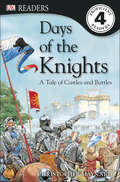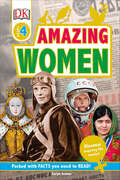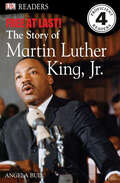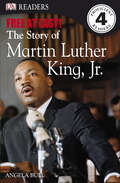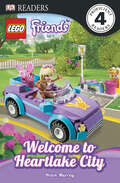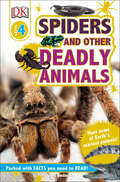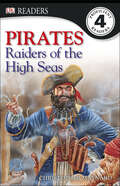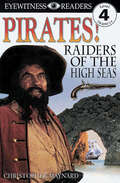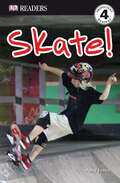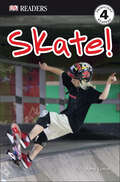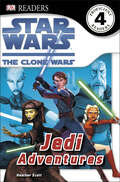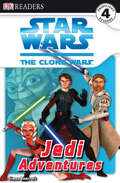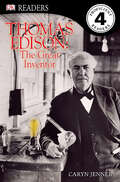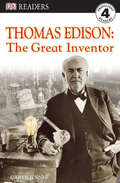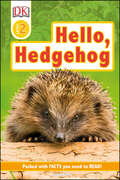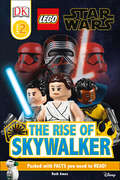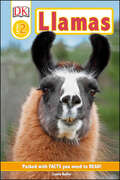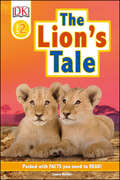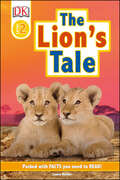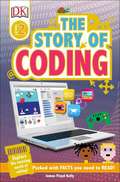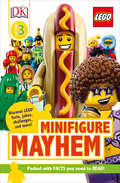- Table View
- List View
DK Readers L4: Days of the Knights (DK Readers Level 4)
by Christopher MaynardSlashing swords, shining armor, knights locked in deadly battle—the mighty castle is under siege!Stunning photographs combine with lively illustrations and engaging, age-appropriate stories in DK Readers, a multilevel reading program guaranteed to capture children's interest while developing their reading skills and general knowledge.With DK Readers, children will learn to read—then read to learn!
DK Readers L4: Discover Inspiring Life Stories! (DK Readers Level 4)
by DKFrom world leaders to explorers to writers, artists, and performers, discover more than 40 women who changed the world and celebrate them this Women's History Month with this Level 4 DK Reader.Amazing Women will build reading skills while teaching vocabulary and telling the stories of influential women like Rosa Parks, Amelia Earhart, and Marie Curie, and highlighting important historical moments in women's history, like the Women's Rights Convention in Seneca Falls. Approaching human rights and gender equality from an age-appropriate angle, this book is a sure way to get kids dreaming about what they can achieve.Uncover the stories of the women who have helped shape the modern world in Amazing Women, and inspire future leaders along the way.Perfect for 9–11 year olds reading independently, reading becomes a fact-discovering adventure with these Level 4 readers. Supporting and encouraging a lifetime love of reading, nonfiction subjects are clearly explained, described vividly, and brought to life with true encounters, fascinating statistics, and dramatic photographic images. Additional information spreads are full of extra fun facts, developing the topics through a range of nonfiction presentation styles, such as articles, journals, and timelines.Series Overview: Trusted by parents, teachers, and librarians, and loved by kids, DK's leveled reading series is now revised and updated. With shiny new jackets and brand-new nonfiction narrative content on the topics kids love, each book is written and reviewed by literacy experts and contains a glossary and index, making them the perfect choice for helping develop strong reading habits for kids ages 3–11.
DK Readers L4: Free At Last: The Story of Martin Luther King, Jr. (DK Readers Level 4)
by Angela BullFree at Last! is a biography of slain civil rights leader Martin Luther King, Jr., who encouraged nonviolent protest to fulfill his dream of an America where people would be judged by the content of their character, not by the color of their skin.
DK Readers L4: Free At Last: The Story of Martin Luther King, Jr. (DK Readers Level 4)
by Angela BullFree at Last! is a biography of slain civil rights leader Martin Luther King, Jr., who encouraged nonviolent protest to fulfill his dream of an America where people would be judged by the content of their character, not by the color of their skin.
DK Readers L4: LEGO Friends: Welcome to Heartlake City (DK Readers Level 4)
by Helen MurrayGo on a reading adventure with the LEGO® Friends!Come explore Heartlake City with Emma, Mia, Andrea, Stephanie, and Olivia. Take a tour of the amazing places in Heartlake City and meet some of the adorable animals that live there.Engaging topics and fun, interactive pages build reading skills in this Level 4 Reader – just right for children who can read alone. A fun quiz at the end of the book helps to develop reading comprehension skills. Each title in the DK Readers series is developed in consultation with leading literacy experts to help children build a lifelong love of reading.©2012 The LEGO Group.
DK Readers L4: LEGO Friends: Welcome to Heartlake City (DK Readers Level 4)
by Helen MurrayGo on a reading adventure with the LEGO® Friends!Come explore Heartlake City with Emma, Mia, Andrea, Stephanie, and Olivia. Take a tour of the amazing places in Heartlake City and meet some of the adorable animals that live there.Engaging topics and fun, interactive pages build reading skills in this Level 4 Reader – just right for children who can read alone. A fun quiz at the end of the book helps to develop reading comprehension skills. Each title in the DK Readers series is developed in consultation with leading literacy experts to help children build a lifelong love of reading.©2012 The LEGO Group.
DK Readers L4: Meet Some of Earth's Scariest Animals! (DK Readers Level 4)
by James BuckleyWhat are the most deadly animals in the world and where do they live? Find out in Spiders and Other Deadly Animals!Learn about the animals that can kill us through life-threatening true stories! Filled with amazing photography and clear text, Spiders and Other Deadly Animals is a fascinating look at the world's scariest animals.Make sure you know how to identify and avoid these creatures with Spiders and Other Deadly Animals.Perfect for 9-11 year olds reading independently, reading becomes a fact-discovering adventure with these Level 4 readers. Supporting and encouraging a lifetime love of reading, nonfiction subjects are clearly explained, described vividly, and brought to life with true encounters, fascinating statistics, and dramatic photographic images. Additional information spreads are full of extra fun facts, developing the topics through a range of nonfiction presentation styles, such as articles, journals, and timelines.Trusted by parents, teachers, and librarians, and loved by kids, DK's leveled reading series is now revised and updated. With shiny new jackets and brand new nonfiction narrative content on the topics kids love, each book is written and reviewed by literacy experts, and contains a glossary and index making them the perfect choice for helping develop strong reading habits for kids ages 3-11.
DK Readers L4: Pirates: Raiders of the High Seas (DK Readers Level 4)
by Christopher MaynardIn this Level 4 DK Reader, meet dastardly pirates who lived across the sea, from Captain Blackbeard to Henry Morgan. Learn about the dangerous lives of these swashbuckling villains and find out who got away with murder—and who had to walk the plank. Stunning photographs combine with lively illustrations and engaging, age-appropriate stories in DK Readers, a multilevel reading program guaranteed to capture children's interest while developing their reading skills and general knowledge.With DK Readers, children will learn to read—then read to learn!
DK Readers L4: Pirates: Raiders of the High Seas (DK Readers Level 4)
by Christopher MaynardIn this Level 4 DK Reader, meet dastardly pirates who lived across the sea, from Captain Blackbeard to Henry Morgan. Learn about the dangerous lives of these swashbuckling villains and find out who got away with murder—and who had to walk the plank. Stunning photographs combine with lively illustrations and engaging, age-appropriate stories in DK Readers, a multilevel reading program guaranteed to capture children's interest while developing their reading skills and general knowledge.With DK Readers, children will learn to read—then read to learn!
DK Readers L4: See the World's Most Spectacular Places! (DK Readers Level 4)
by Jen GreenHow do waterfalls form? How long is the Nile River? Who led the first expedition on Mount Everest?Discover the earth's most amazing natural wonders in Big Fantastic Earth!Explore the highest peak of Mount Kilimanjaro to the deep grooves of the Grand Canyon, and discover how the incredible landscapes around the world were formed. Big Fantastic Earth takes readers on an exciting journey around the world's incredible natural architecture.Perfect for 9–11 year olds reading independently, reading becomes a fact-discovering adventure with these Level 4 readers. Supporting and encouraging a lifetime love of reading, nonfiction subjects are clearly explained, described vividly, and brought to life with true encounters, fascinating statistics, and dramatic photographic images. Additional information spreads are full of extra fun facts, developing the topics through a range of nonfiction presentation styles, such as articles, journals, and timelines.Lexile measure: 800 Fountas and Pinnell Text Level Gradient: OTrusted by parents, teachers, and librarians, and loved by kids, DK's leveled reading series is now revised and updated. With shiny new jackets and brand new nonfiction narrative content on the topics kids love, each book is written and reviewed by literacy experts, and contains a glossary and index making them the perfect choice for helping develop strong reading habits for kids ages 3–11.
DK Readers L4: Skate! (DK Readers Level 4)
by Amy JunorAdvanced readers will adore this thrilling book about the world of skateboarding. Follow Gus, a beginning skateboarder, as he learns basic moves as well as the more complex tricks and jumps. Read all about how Gus makes friends and teaches them new skateboard tricks. Stunning photographs combine with lively illustrations and engaging, age-appropriate stories in DK Readers, a multilevel reading program guaranteed to capture children's interest while developing their reading skills and general knowledge. With DK Readers, children will learn to read—then read to learn!
DK Readers L4: Skate! (DK Readers Level 4)
by Amy JunorAdvanced readers will adore this thrilling book about the world of skateboarding. Follow Gus, a beginning skateboarder, as he learns basic moves as well as the more complex tricks and jumps. Read all about how Gus makes friends and teaches them new skateboard tricks. Stunning photographs combine with lively illustrations and engaging, age-appropriate stories in DK Readers, a multilevel reading program guaranteed to capture children's interest while developing their reading skills and general knowledge. With DK Readers, children will learn to read—then read to learn!
DK Readers L4: Star Wars: The Clone Wars: Jedi Adventures (DK Readers Level 4)
by Simon BeecroftTaking place between the last two Star Wars® films, Episode II: Attack of the Clones and Episode III: Revenge of the Sith, the Clone Wars fill a dark period in the history of the Galaxy. DK and Lucasfilm celebrate the all-new computer-generated animated series that will launch theatrically in August 2008 with three new Clone Wars titles. Now young readers can experience more Jedi action, more villainous battles, more weapons, more imagery, more fun, and more excitement! Join the Jedi Knights on daring adventures throughout the galaxy in Star Wars®: The Clone Wars™ Reader Level 4: Jedi Adventures. © 2008 Lucasfilm Ltd. ® & TM
DK Readers L4: Star Wars: The Clone Wars: Jedi Adventures (DK Readers Level 4)
by Simon BeecroftTaking place between the last two Star Wars® films, Episode II: Attack of the Clones and Episode III: Revenge of the Sith, the Clone Wars fill a dark period in the history of the Galaxy. DK and Lucasfilm celebrate the all-new computer-generated animated series that will launch theatrically in August 2008 with three new Clone Wars titles. Now young readers can experience more Jedi action, more villainous battles, more weapons, more imagery, more fun, and more excitement! Join the Jedi Knights on daring adventures throughout the galaxy in Star Wars®: The Clone Wars™ Reader Level 4: Jedi Adventures. © 2008 Lucasfilm Ltd. ® & TM
DK Readers L4: Thomas Edison: The Great Inventor (DK Readers Level 4)
by Caryn JennerPerfect for advanced young readers, this book tells the exciting story of the legendary Thomas Edison. Budding historians will revel in this tale of the greatest inventor of the modern age. Imagine where we'd be without his brilliant creations!From the first light bulb to moving pictures, Edison proved himself to be one of the most important men in US history. Includes gorgeous, full-color photography and a complete glossary of terms.Stunning photographs combine with lively illustrations and engaging, age-appropriate stories in DK Readers, a multilevel reading program guaranteed to capture children's interest while developing their reading skills and general knowledge.With DK Readers, children will learn to read—then read to learn!
DK Readers L4: Thomas Edison: The Great Inventor (DK Readers Level 4)
by Caryn JennerPerfect for advanced young readers, this book tells the exciting history of the legendary Thomas Edison. Budding historians will revel in this story of the greatest inventor of the modern age. Imagine where we'd be without his brilliant creations!From the first light bulb to moving pictures, Edison proved himself to be one of the most important men in US history. Includes gorgeous, full-color photography and a complete glossary of terms.Stunning photographs combine with lively illustrations and engaging, age-appropriate stories in DK Readers, a multilevel reading program guaranteed to capture children's interest while developing their reading skills and general knowledge.With DK Readers, children will learn to read—then read to learn!
DK Readers Level 2: Hello Hedgehog (DK Readers Level 2)
by Laura BullerSay hello to a hedgehog with this non-fiction wildlife book for kids. Packed full of fun facts and adorable hedgehog pictures, this children's reading book is the perfect way to learn about, and celebrate, this much-loved creature.In this chapter book for children, you'll learn how to help hedgehogs, why they have prickly spines covering their backs and all about their hibernation. These fascinating facts are paired with cute, high-quality photographs of hedgehogs, providing an ideal balance of words and images for children learning to read.Created with the help of top literacy consultants, Hello Hedgehog is the perfect book to help build general knowledge at the same time as learning to read. As this unique animal is such a favorite for kids, this book will encourage reading for pleasure, which is linked with improved reading and writing skills.Hello Hedgehog is a new Level 2 title in the engaging four-level DK Readers series, aimed at children who are beginning to read. Developing a lifelong love of reading, DK Readers cover a vast range of fascinating subjects to support children as they become confident readers. DK Level 2 readers are suitable for children reading book band books up to orange level in the UK, and assessed by Fountas and Pinnell and Lexile levels in the US.
DK Readers Level 2: LEGO Star Wars The Rise of Skywalker (DK Readers Level 2)
by DK Ruth AmosJoin the ultimate battle for the LEGO® Star Wars™ galaxy!Travel the galaxy with the Resistance heroes. Discover new planets and meet new friends. Find out about the First Order's plot to rule the galaxy. Can the heroes defeat the villains?Engaging topics and fun, interactive pages build reading skills in this Level 2 Reader – just right for children who are beginning to read on their own. A glossary and fun quiz at the end of the book help to develop vocabulary and reading comprehension skills. Each title in the DK Readers series is developed in consultation with leading literacy experts to help children build a lifelong love of reading.©2020 The LEGO Group. © & TM 2020 LUCASFILM LTD.
DK Readers Level 2: Llamas (DK Readers Level 2)
by DKLearn to read while getting to know lovely, long-necked llamas.Get to know South America's most famous cameloid with this DK learn-to-read book. Kids will love learning why llamas spit, how they keep their footing in the Peruvian mountains, and what separates them from their alpaca cousins.Llamas is a new title in the exciting and engaging four-level DK Readers series. Developing a lifelong love of reading, DK Readers cover a vast range of fascinating subjects to support children as they learn to read.Packed with fun facts for kids, this innovative series of guided reading books balance amazing photography with nonfiction narratives tailored to specific reading levels. DK Readers are assessed by both Fountas & Pinnell and Lexile levels, and are ideal for learning to read while building general knowledge. Llamas covers a topic that will engage kids, encouraging reading for pleasure - linked with improved reading and writing abilities, as well as a wider vocabulary and greater self confidence.
DK Readers Level 2: Llamas (DK Readers Level 2)
by DKLearn to read while getting to know lovely, long-necked llamas.Get to know South America's most famous cameloid with this DK learn-to-read book. Kids will love learning why llamas spit, how they keep their footing in the Peruvian mountains, and what separates them from their alpaca cousins.Llamas is a new title in the exciting and engaging four-level DK Readers series. Developing a lifelong love of reading, DK Readers cover a vast range of fascinating subjects to support children as they learn to read.Packed with fun facts for kids, this innovative series of guided reading books balance amazing photography with nonfiction narratives tailored to specific reading levels. DK Readers are assessed by both Fountas & Pinnell and Lexile levels, and are ideal for learning to read while building general knowledge. Llamas covers a topic that will engage kids, encouraging reading for pleasure - linked with improved reading and writing abilities, as well as a wider vocabulary and greater self confidence.
DK Readers Level 2: The Lion's Tale (DK Readers Level 2)
by Laura BullerLearn to read while getting up close to the magnificent lion in this exciting book.Find out how a lion cub joins the pride and grows to become the king of the jungle, discover how lions in Asia and Africa are different, and learn why we need to work to protect these endangered animals in the wild.Amazing up-close photographs show lions playing on the plains of Africa, providing strong visual clues to build vocabulary and confidence. Amazing facts encourage enthusiasm for reading. Additional information spreads build knowledge further, such as how lions have adapted to be top hunters. There's also a fun quiz to develop reading comprehension. This book has been developed in consultation with literacy experts to help improve children's reading ability. A Lion's Tale is a new title in the exciting and engaging four-level DK Readers series. Developing a lifelong love of reading, DK Readers cover a vast range of fascinating subjects featuring DK's stunning photography, to support children as they learn to read.Packed with fun facts for kids, this innovative series of levelled guided reading books combines a highly visual approach with engaging nonfiction narratives. Reading levels progress from brief, simple text in the early readers, to slightly longer, more detailed nonfiction chapter books, to challenging nonfiction containing rich vocabulary and more complex sentence structures. DK Readers are assessed by both Fountas & Pinnell and Lexile levels, and are ideal for learning to read, for subject research, and of course, for children to read for pleasure.
DK Readers Level 2: The Lion's Tale (DK Readers Level 2)
by Laura BullerLearn to read while getting up close to the magnificent lion in this exciting book.Find out how a lion cub joins the pride and grows to become the king of the jungle, discover how lions in Asia and Africa are different, and learn why we need to work to protect these endangered animals in the wild.Amazing up-close photographs show lions playing on the plains of Africa, providing strong visual clues to build vocabulary and confidence. Amazing facts encourage enthusiasm for reading. Additional information spreads build knowledge further, such as how lions have adapted to be top hunters. There's also a fun quiz to develop reading comprehension. This book has been developed in consultation with literacy experts to help improve children's reading ability. A Lion's Tale is a new title in the exciting and engaging four-level DK Readers series. Developing a lifelong love of reading, DK Readers cover a vast range of fascinating subjects featuring DK's stunning photography, to support children as they learn to read.Packed with fun facts for kids, this innovative series of levelled guided reading books combines a highly visual approach with engaging nonfiction narratives. Reading levels progress from brief, simple text in the early readers, to slightly longer, more detailed nonfiction chapter books, to challenging nonfiction containing rich vocabulary and more complex sentence structures. DK Readers are assessed by both Fountas & Pinnell and Lexile levels, and are ideal for learning to read, for subject research, and of course, for children to read for pleasure.
DK Readers Level 2: The Story of Coding, First American Edition
by James Floyd KellyThis book is part of an exciting four-level reading series for children, developing the habit of reading widely for both pleasure and information. These chapter books have a compelling main narrative to suit your child's reading ability. Each book is designed to develop your child's reading skills, fluency, grammar awareness, and comprehension in order to build confidence and engagement when reading.
DK Readers Level 3: Discover LEGO facts, jokes, challenges, and more! (DK Readers Level 3)
by DKJoin the LEGO® minifigure party with a bunch of wacky and wonderful LEGO characters!Full of facts, jokes and activities, this book is perfect for young LEGO fans who are beginning to develop a love of reading. Find out about some of the coolest and silliest LEGO minifigure characters with simple, entertaining text and fun fact files. Discover the Chef's tastiest creations, laugh at the Clown's funniest jokes, and be inspired by creative LEGO play ideas and challenges.LEGO Minifigure Mayhem is packed with colorful images that will encourage even reluctant readers to read more about their favorite LEGO characters, and beyond.©2019 The LEGO Group.
DK Readers Level 3: Discover LEGO facts, jokes, challenges, and more! (DK Readers Level 3)
by DKJoin the LEGO® minifigure party with a bunch of wacky and wonderful LEGO characters!Full of facts, jokes and activities, this book is perfect for young LEGO fans who are beginning to develop a love of reading. Find out about some of the coolest and silliest LEGO minifigure characters with simple, entertaining text and fun fact files. Discover the Chef's tastiest creations, laugh at the Clown's funniest jokes, and be inspired by creative LEGO play ideas and challenges.LEGO Minifigure Mayhem is packed with colorful images that will encourage even reluctant readers to read more about their favorite LEGO characters, and beyond.©2019 The LEGO Group.
